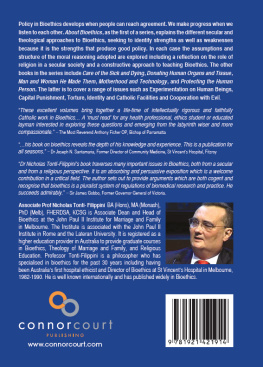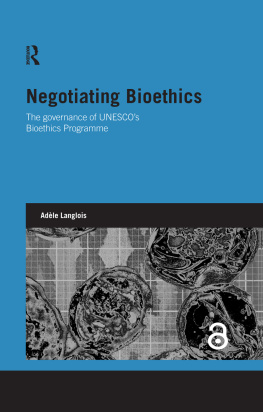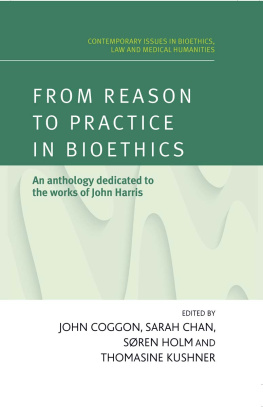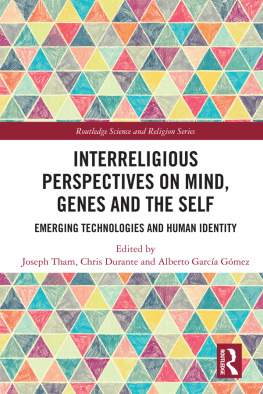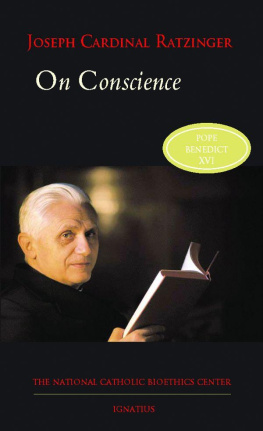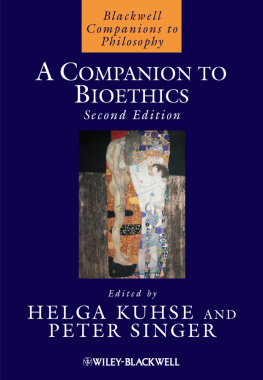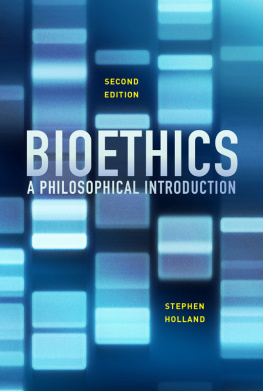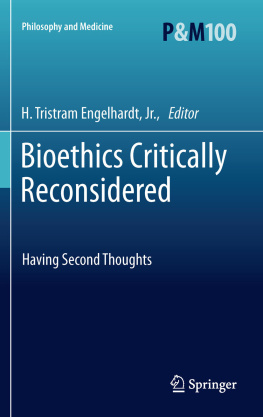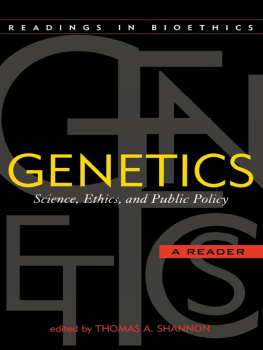About Bioethics
Philosophical and Theological Approaches
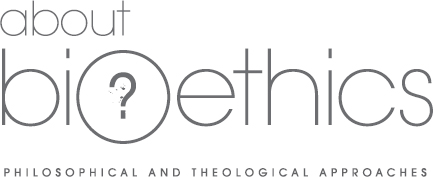
Nicholas Tonti-Filippini

Published in 2011 by Connor Court Publishing Pty Ltd.
Copyright Nicholas Tonti-Filippini, 2011
All rights reserved. No part of this book may be reproduced or transmitted in any form or by any means, electronic or mechanical, including photocopying, recording or by any information storage and retrieval system, without prior permission in writing from the publisher.
Connor Court Publishing Pty Ltd.
PO Box 1
Ballan VIC 3342
www.connorcourt.com
ISBN: 9781921421914 (pbk.)
eISBN: 9781922168184
Front cover design: Ian James
Scripture quotations, unless otherwise noted, are from the Revised Standard Version of the Bible.
Excerpts of Vatican documents are from the English translation found on the Vatican webpage: www.vatican.va.
Printed and designed in Australia.
CONTENTS
8. Index
Preface
T he idea for this series came about through illness. For many years I had been teaching and consulting in Bioethics, conducting conferences, publishing articles in the peer reviewed journals, and editing proceedings and the occasional collection, but, apart from writing for the doctorate and masters, I had not ever found time to create a collection of my own work. My time was limited because not only did I have a family, but I have also been chronically ill for thirty-three years with renal disease and have been on haemodialysis for the past twenty years, which is very time-consuming. More recently I developed coronary disease and, following failed bypass surgery, underwent fifteen angioplasty procedures to reconstruct the arteries and place some eight stents to keep them open. The disease has also caused loss of vision and loss of sensation, making typing difficult. It was because I could not travel and because I was ill that this book became possible. Much of the editing was done during dialysis sessions. I am grateful to Vision Australia for the technology, including dictation software, that allows me to keep writing.
In this book I discuss the different approaches to Bioethics both secular and religious and the assumptions and structure of the moral reasoning adopted, the role of religion in a secular society and an approach to teaching Bioethics. This book is to be the first of a series on Bioethics with subsequent books in the series on the Care of the Sick and Dying, Donating Human Organs and Tissue, Man and Woman He Made Them, Motherhood and Technology, Creation, Evolution and the Environment and Protecting the Human Person. The latter is to cover a range of issues such as Experimentation on Human Beings, Capital Punishment, Torture, Identity and Catholic Facilities and Cooperation with Evil.
My interest in Bioethics began in 1977 when, having taken philosophy as a breadth subject, I became interested in it in the same year as I was diagnosed with a rheumatoid disease that was destroying my kidneys and threatening other vital organs. Told that I would die within five years and having become interested in philosophy, I saw no harm in making the latter my principal interest rather than following a more career-oriented path.
Having published in the area of Bioethics, while still a student in 1982, I was asked by Dr Joseph Santamaria, then the Director of Community Medicine at St Vincents Hospital, Melbourne, and the hospitals Sister Administrator, Sr. Maureen Walters RSC, to assist St Vincents with the formation of a Bioethics Centre and to assist the director of nursing, Sr Rose Holman RSC, by teaching nursing ethics in the School of Nursing. The position was supported by Dr Joes brothers, BA Santamaria and John Santamaria, and by Archbishop Sir Frank Little, then archbishop of Melbourne. At the time I was teaching environmental ethics in the Graduate School of Environmental Science at Monash University.
I became hospital ethicist and later Director of the Bioethics Department at St Vincents while completing graduate studies. I was greatly privileged to work with the Bioethics Centre which then involved Sr Maureen Walters RSC, Sr Rose Holman RSC, Dr John J Billings (of the Ovulation Method), the then dean of the Clinical School, Dr Eric Seal (a psychiatrist), Dr Bernard Clarke (Head of Intensive Care), Rev Dr Francis Harman, Rev Dr Norman Ford SDB, Rev Dr Tom Daly SJ, Rev Dr Laurence Fitzgerald OP and Mr Joseph Santamaria QC, and later Dr Gabrielle McMullen.
Despite never really choosing a career, Bioethics became for me a fulltime occupation.
Working in a hospital with the medical and nursing staff and supported by a group such as that, while battling my own illnesses, was a position of extraordinary advantage for a young person and I am deeply indebted for the opportunities given to me especially by the Sisters of Charity and by Dr Joseph Santamaria. He and the late Dr Francis Harman were my mentors throughout that period. I owe much also to Archbishop Sir Frank Little, who had recommended me to St. Vincents at a time when I served as a student representative on the Board of Mannix College at Monash University. He took a keen interest, provided some financial support to the Bioethics Centre and made it clear that I was always welcome to call on him. After Mary and I married, he became a visitor to our home in Hawthorn and would often seek an opinion on matters related to Bioethics.
While at St. Vincents I taught in the School of Nursing, consulted to the medical and nursing staff, and served on numerous medical committees. I also became relatively well known and travelled widely, including many trips to Rome to speak on Bioethics topics. It was an exciting time with the advent of reproductive technology and the development of the document Donum Vitae by the Congregation for the Doctrine of the Faith. During that time, Kevin Andrews (later a Minister in the Australian Government) and Anna Duffy (later Krohn) were research officers with the Department at St. Vincents, and I am grateful for their assistance and for the help of my personal assistant, Mrs Myrna John. I learned much from her and especially through knowing her son Brian, who has Downs Syndrome. Also assisting at that time were several Dominican seminarians, including the future Bishop Anthony Fisher OP and the late Fr Colin Spokes OP, both of whom became great friends. We often pray to Colin asking him to intercede when times are difficult. They both assisted at the St Vincents Bioethics Centre conferences, carrying the microphones up and down the aisles. At that time I came to know Dr Ray Campbell and Rev Dr John Fleming, with whom I have collaborated many times since.
I met Dr Mary Walsh in November 1982 while attending a Queensland Right to Life conference in Brisbane, having been billeted by a match-making Winifred Egan with Mary and her brother Nicholas. We married in January 1985, having conducted a courtship from afar. Being married to a general practitioner helped me to keep a focus on medical ethics and we formed a team, including undertaking some research on fertility awareness in general practice that resulted in a professional development program based on the Billings Ovulation Method and accredited by the Royal Australian College of General Practitioners and the Royal Australia and New Zealand College of Obstetrics and Gynaecology. We have been married for twenty-six years and have four children. With my illnesses, Mary has had much to endure, and if I have achieved anything worthwhile it is because she has provided so much love and support, including having given me four children, Claire, Lucianne, Justin and John. My education owes much to them.
Next page
